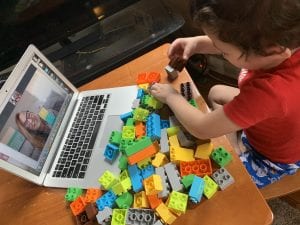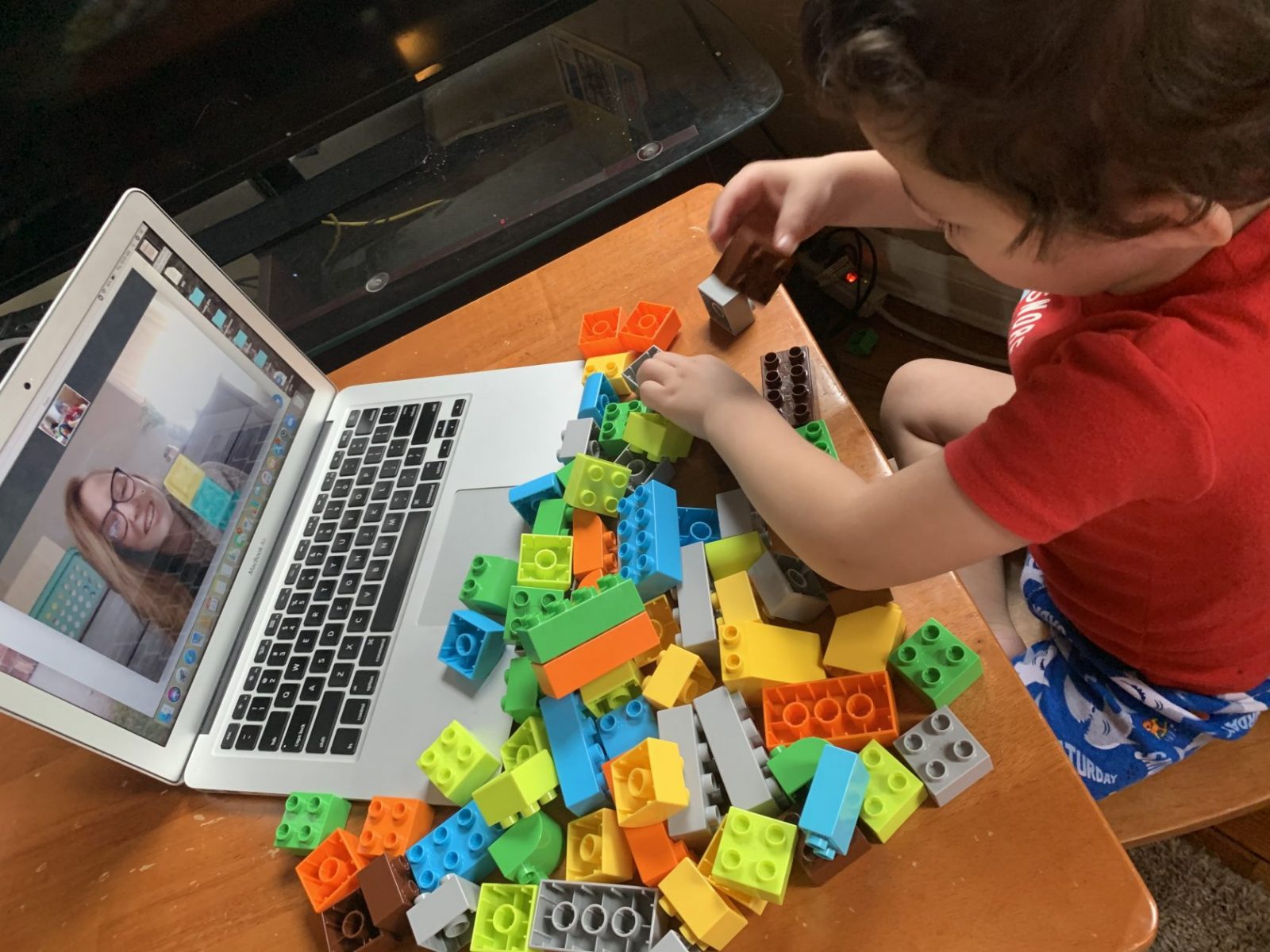WESTFIELD-In less than a year, Kasen Rojas has made “tremendous progress toward his speech” through Thom Westfield Infant Toddler Services, according to his parents, Nicole Dean and William Rojas.
“He is 2 1/2 now and is saying three to five words put together,” said Dean, adding, “he knows how to communicate now with little frustration.”
Dean explained that her son’s pediatrician made the referral because Kasen wasn’t verbalizing a lot of words.
“Kasen had frustration in the beginning due to not being able to communicate, he now rarely gets frustrated and can use his words for everything he is wanting and feeling,” said Dean.

Chelsey Anderson, MA, CCC-SLP, a speech language pathologist with Thom Westfield Infant Toddler Services, works with Kasen Rojas during a teletherapy session. (NICOLE DEAN PHOTO)
While in-home services have been suspended due to the COVID-19 pandemic, the staff at Thom Westfield Infant Toddler Services is continuing to take referrals and provide services to children and families using a “telehealth approach,” according to Patricia E. Kuzmeski, RN, BSN, program director.
“Traditionally we have been able to provide face-to-face services to families in their homes and in the community,” said Kuzmeski. “During the COVID-19 crisis, we cannot provide these services face-to-face, but our goals remain the same. With the support of modern technology, we are able to work with families to provide individualized, family centered support.”
Kuzmeski noted that Early Intervention (EI) services are intended to support the healthy development of very young children and their families. EI is a program for children birth to three who have developmental delays or are at risk of a developmental delay.
“Teletherapy is a great way to begin services with families,” said Kuzmeski. “Evaluations are currently taking place via teleconference by observation and parent interview with a multidisciplinary team. If it is determined that a child has a delay in an area of development (cognition, personal/social, communication, motor, and self care), services are able to begin.”
All early intervention services are provided at no cost to the family. EI services are reimbursed by family insurance, MassHealth, or the Department of Public Health as the payer of last resort, according to Kuzmeski.
Kuzmeski said her staff of 70 includes a range of clinical therapists, as well as nurses, social workers, mental health counselors, developmental specialists and educators, and behavior specialists. In addition, the program offers teaching assistants who help run play groups and a parent liaison meets with and supports families as they transition out of EI into the local school system, if that is the next step for the child.
“Our program is wonderful because of our caring staff,” said Chelsey Anderson, MA, CCC-SLP, speech language pathologist. “We have such a great team of clinicians that wholeheartedly cares about their kids and families. These difficult times have been a testament to how much our team cares for each family in our program. Despite all that is happening today, this is still a crucial time for the development in children birth to three and our staff understands this; we are doing everything we can to improve not only the child’s development, but also to assure our families that we are here and we will do everything we can to help.”
Prior to the beginning of “telehealth,” evaluations and direct therapy sessions took place in the home. Due to COVID-19 and social distancing, telehealth has become an “amazing avenue” for therapists to continue to help their clients and families to make progress and carry over the skills that they have been targeting, added Anderson.
“Most of our sessions occur via video conferencing,” said Anderson. “Many of our clinicians have really enjoyed the user-friendly platform, Zoom. Clinicians schedule a call and families are able to just click a link to sign into a meeting.”
Anderson noted that during sessions, staff members coach parents and caregivers to use whatever materials, toys, or objects they have at home to learn through play. These skills may include teaching a child to communicate their specific wants and needs, or helping a parent teach their child how to use a spoon.
“Siblings can also be involved,” said Anderson.
Teleconferencing allows clinicians to troubleshoot areas that are hard for caregivers and their children throughout their daily routine, and provide strategies to encourage growth and development.
“This has been a wonderful way to have continuity of services with families and help families navigate this tough time of being home,” said Anderson. “Our sessions provide a time for families and clinicians to focus on learning through play.”
Another service that has continued during the pandemic is offering play groups – now via Zoom.
“This provides kids some structured play, with songs, books, and art while continuing to see peers and their teachers,” said Anderson, noting approximately 15 youngsters are currently engaged in the program. “Each week we are having a theme for children and their families.”
For Dean and Rojas, they are eager to tout the program and encourage other parents to seek out services if they are concerned about their child’s well-being.
“Thom EI is beyond phenomenal,” said Dean. “They are kind, caring, patient and so encouraging. The progress my son has made with his speech is all because of Thom EI, and I am so thankful for them that I would recommend any family that has questions regarding their children’s speech or any services to reach out, they will be offered the best services.”
Since Kasen was referred in April 2019, he will soon be ineligible to continue receiving services.
“We will be so sad to not see them once my son ages out, but they will always remain in our hearts and how thankful we have been for them,” said Dean.








